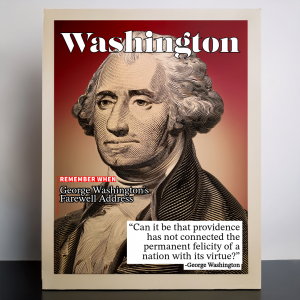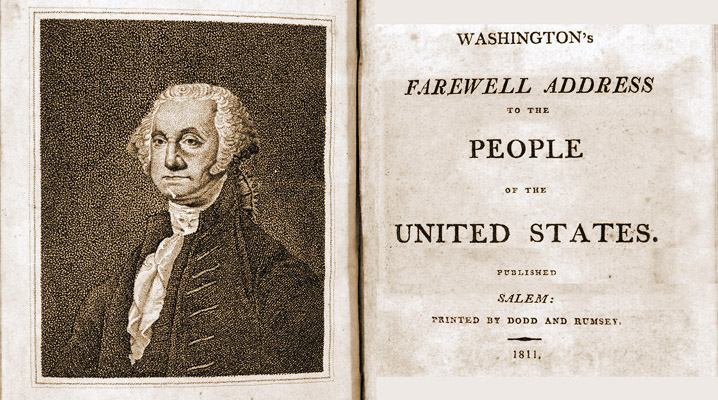After two terms in office, in 1796, George Washington decided to leave his presidency days behind when he issued what would be known as one of the most remembered documents in US history: his Farewell Address. However, his Farewell Address was more than just a fancy retirement announcement; it was a complete analysis of the character of the country he led and the values he believed were necessary to keep the country strong. At the time of the address, there were internal political division issues with the emerging Democratic-Republican and Federalist parties, as well as the French Revolution, causing growing tension throughout Europe, which pushed America’s foreign policy. The result of all this is Washington reminding all Americans to be cautious against what he saw as dangers that were to come, what exactly united us as a country, and calling them to be better citizens.
The Farewell Address discusses many interconnected themes that are all relevant today. One big push was for national unity, which is very important today. He tries to warn the Americans that their union should be of trust rather than because of convenience. Washington heavily urges against sectionalism and tries to emphasize that the benefits of prosperity and peace can only be kept if there’s shared governance as well as mutual loyalty in the country[1]. Through this, he also emphasizes that unity politically isn’t just about structural but emotional and built on what he calls “cordial, habitual, and immovable attachments.”[2]
In recent years, some commentators as well as scholars have brought up the fading importance of Washington’s Farewell Address. Bill Kaufman wrote in The American Enterprise, how the annual Senate reading of the address occurs in a “largely empty chamber”[3], which is an unfortunate testimony to the decline the document faces in terms of relevance. However, Michael Dunne also argues that “the text retains a ‘plasticity’[4], a capacity to be interpreted and reinterpreted across generations that keeps it central to American political thought.
I believe the relevance of the Farewell Address is very visible, however, in today’s political environment. Washington specifically issued a warning against excessive partisanship, which is exactly what we saw in the more recent, nastily divided election cycles, as well as in gridlocked congresses. He had fears of political parties “kindling animosity” and “enfeebling the public administration,”[5] which all come to life today in this time of intense polarization, social media acting as an echo chamber, and rising distrust in the institutions of democracy we have established. Washington foresaw that the interests of specific political parties would overtake trying to protect the common good, which makes many of today’s national debates seem as though they are some sort of battle to win between enemies rather than a discussion of disagreements between citizens.
In the same way, I think Washington’s counsel regarding foreign policy is very important in our society today, as I think our world has shifted to alliances and global interdependence. Washington specifically warned us about the dangers that come with forging permanent alliances. He didn’t mean for the U.S. to isolate itself, but he wanted us to try and keep ourselves in a position that would let us act with moral clarity. A lot of the political leaders we see today deal with these challenges as they must make decisions regarding their commitments to NATO, trade policies with China, or even showing support for Ukraine. These issues typically invoke Washington’s idea of having measured engagement.
Washington doesn’t exactly offer us specific policies for today’s society in his Farewell Address, as he is simply a guide from the early republic of our nation. However, he does give us something that can be seen as a lot more valuable, which is a set of guidelines for what restraint, civic responsibility, and unity are, which will be written into the books forever. Washington’s Farewell Address gives a good challenge to Americans in modern society, whether they be policymakers, voters, or even activists, to reflect on their rights and shared duties. George Washington’s Farewell Address will remain a call from a “parting friend”[6] trying his best to preserve his fragile nation for the future.

Footnotes
[1] Spalding, “George Washington’s Farewell Address,”.
[2] Washington’s Farewell Address, 106th Cong., 2nd sess.
[3] Kauffman, “Farewell George,”.
[4] Dunne, “Farewell to the Farewell Address?”.
[5] Washington’s Farewell Address, 106th Cong., 2nd sess.
[6] Washington’s Farewell Address, 106th Cong., 2nd sess.
Bibliography
Dunne, Michael. “Farewell to the Farewell Address? Or A ‘Discourse of the Permanent and Transient in American Politics.’” Virginia Quarterly Review 77, no. 2 (March 1, 2001).
Kauffman, Bill. “Farewell George.” American Enterprise 7, no. 2 (March 1, 1996).
Spalding, Matthew. “George Washington’s Farewell Address.” The Wilson Quarterly 20, no. 4 (September 22, 1996).
U.S. Senate. Washington’s Farewell Address to the People of the United States. 106th Cong., 2nd sess., S. Doc. 106–21. Washington, DC: Government Printing Office, 2000.
